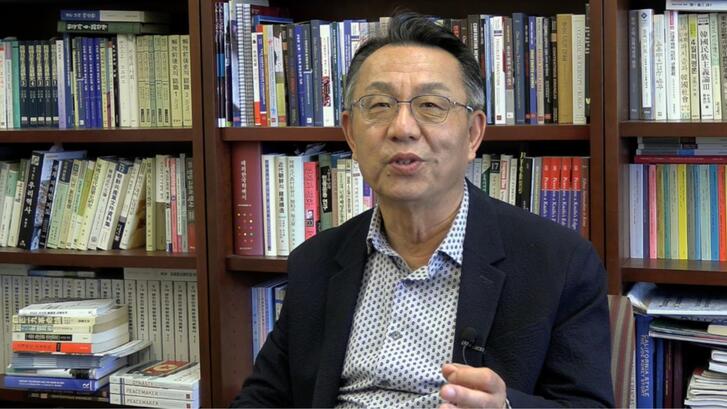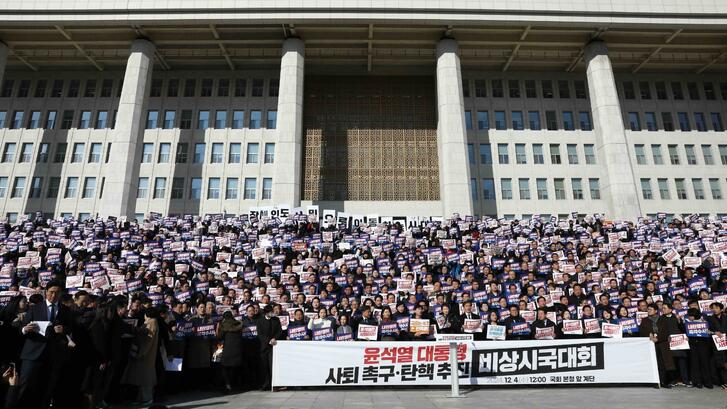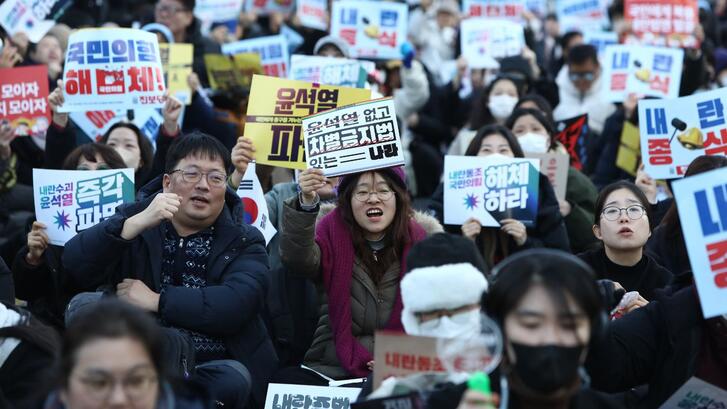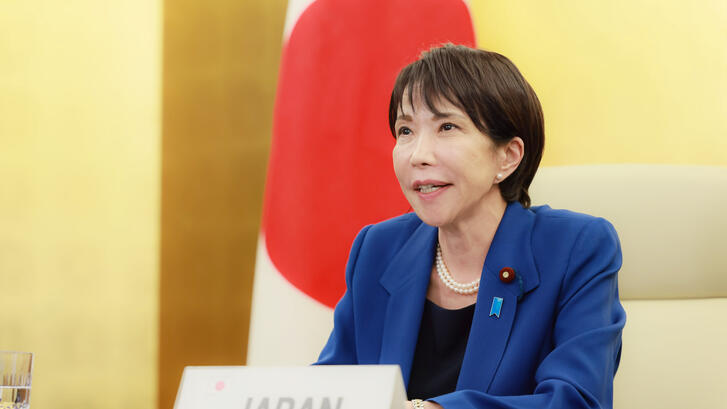South Korea May Regret Being First with New AI Law
On January 22, South Korea introduced its AI Basic Act, which it claimed to be “the world’s first comprehensive body of laws to regulate artificial intelligence.” The government claims the legislation will help propel the country to be a leader in the global race for AI leadership by establishing a “foundation for trust” while also protecting the interests of citizens.
2026 Oksenberg Conference – Coping with a Less Predictable United States
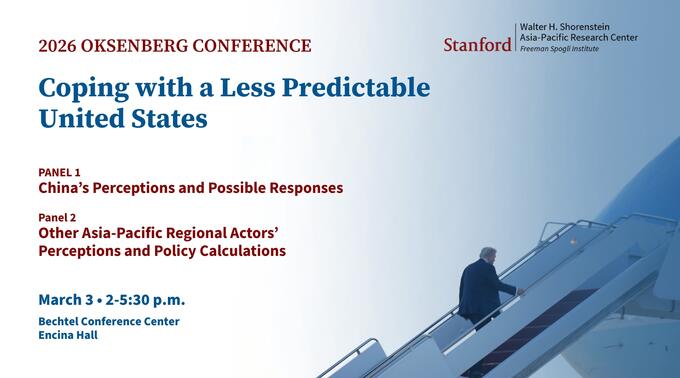
The content, consistency, and predictability of U.S. policy shaped the global order for eight decades, but these lodestars of geopolitics and geoeconomics can no longer be taken for granted. What comes next will be determined by the ambitions and actions of major powers and other international actors.
Some have predicted that China can and will reshape the global order. But does it want to? If so, what will it seek to preserve, reform, or replace? Choices made by China and other regional states will hinge on their perceptions of future U.S. behavior — whether they deem it more prudent to retain key attributes of the U.S.-built order, with America playing a different role, than to move toward an untested and likely contested alternative — and how they prioritize their own interests.
This year’s Oksenberg Conference will examine how China and other Indo-Pacific actors read the geopolitical landscape, set priorities, and devise strategies to shape the regional order amid uncertainty about U.S. policy and the future of global governance.
PANEL 1
China’s Perceptions and Possible Responses
Moderator
Thomas Fingar
Shorenstein APARC Fellow, Freeman Spogli Institute for International Studies, Stanford University
Panelists
Da Wei
Professor and Director, Center for International Security and Strategy, Tsinghua University
Mark Lambert
Retired U.S. Department of State Official, Formerly China Coordinator and Deputy Assistant Secretary
Susan Shirk
Research Professor, School of Global Policy and Strategy, University of California San Diego
PANEL 2
Other Asia-Pacific Regional Actors’ Perceptions and Policy Calculations
Moderator
Laura Stone
Retired U.S. Ambassador and Career Foreign Service Officer; Inaugural China Policy Fellow at APARC, Stanford University
Panelists
Victor Cha
Distinguished University Professor, D.S. Song-KF Chair, and Professor of Government, Georgetown University
Katherine Monahan
Visiting Scholar and Japan Program Fellow 2025-2026, APARC, Stanford University
Kathryn Stoner
Satre Family Senior Fellow, Freeman Spogli Institute for International Studies, Stanford University
Emily Tallo
Postdoctoral Fellow, Center for International Security and Cooperation, Stanford University
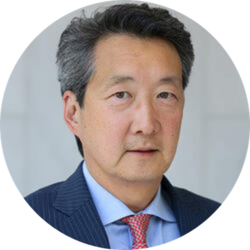
Victor Cha is Distinguished University Professor at Georgetown University and President of the Geopolitics and Foreign Policy Department at the Center for Strategic and International Studies in Washington, D.C. He previously served on the Defense Policy Board for the Biden administration and on the National Security Council for the George W. Bush administration. He is the award-winning author of nine books including The Black Box: Demystifying the Study of Korean Unification and North Korea (Columbia, 2025). His newest book is China’s Weaponization of Trade: Resistance Through Collective Resilience(Columbia, January 2026) with E. Kim and A. Lim. Dr. Cha received his PhD, MIA, and BA from Columbia University and a BA with honors from Oxford University.
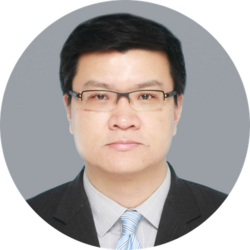
Da Wei is the director of the Center for International Security and Strategy (CISS) at Tsinghua, and professor of department of International Relations, school of Social Science, Tsinghua University. Dr. Da ’s research expertise covers China-US relations and US security & foreign policy. Da Wei has worked in China’s academic and policy community for more than 2 decades. Prior to current positions, Dr. Da Wei was the assistant president of University of International Relations (2017-2020), director of the Institute of American Studies, China Institutes of Contemporary International Relations (2013-2017). He has written hundreds of policy papers to Chinese government, and published dozens of academic papers on journals in China, the US and other countries.
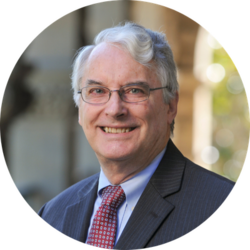
Thomas Fingar is a Shorenstein APARC Fellow in the Freeman Spogli Institute for International Studies at Stanford University. He was the inaugural Oksenberg-Rohlen Distinguished Fellow from 2010 through 2015 and the Payne Distinguished Lecturer at Stanford in 2009.
From 2005 through 2008, he served as the first deputy director of national intelligence for analysis and, concurrently, as chairman of the National Intelligence Council. Fingar served previously as assistant secretary of the State Department’s Bureau of Intelligence and Research (2000-01 and 2004-05), principal deputy assistant secretary (2001-03), deputy assistant secretary for analysis (1994-2000), director of the Office of Analysis for East Asia and the Pacific (1989-94), and chief of the China Division (1986-89). Between 1975 and 1986, he held several positions at Stanford University, including senior research associate in the Center for International Security and Arms Control.
Fingar is a graduate of Cornell University (A.B. in Government and History, 1968) and Stanford University (M.A., 1969, and Ph.D., 1977, both in political science). His numerous publications include the most recent book, From Mandate to Blueprint: Lessons from Intelligence Reform (Stanford University Press, 2021).
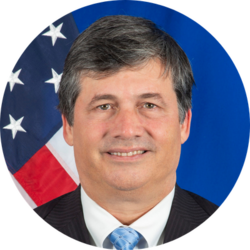
Mark Lambert is a retired State Department official. He served as China Coordinator and Deputy Assistant Secretary in the Bureau of East Asia and Pacific Affairs. He oversaw the Office of China Coordination and the Office of Taiwan Coordination. Mark has extensive experience in China, cross-Strait, and Asia Pacific affairs. He served as Deputy Assistant Secretary with responsibility for Japan, Korea, Mongolia, Australia, New Zealand, and the Pacific Islands. Earlier he established the International Organizations Bureau’s office aimed at protecting UN integrity from authoritarianism and served as Special Envoy for North Korean Affairs. Previously, he was named the State Department’s human rights officer of the year for devising a strategy to release Chinese political prisoners and promote religious freedom.

Katherine Monahan is a visiting scholar and Japan Program Fellow for the 2025-26 academic year. Ms. Monahan has completed 16 assignments on four continents during her 30 years as a Foreign Service Officer with the U.S. Department of State. She recently returned from Tokyo, where she was Deputy Chief of Mission at the U.S. Embassy in Japan, following roles as Charge d’affaires for Papua New Guinea, Solomon Islands, and Vanuatu, and Deputy Chief of Mission to New Zealand, Samoa, Cook Islands, and Niue. She was Director for East Asia at the National Security Council from 2022 to 2023. Previously, she worked for the U.S. Department of the Treasury in Tokyo as Economic, Trade and Labor Counselor in Mexico City, Privatization Lead in Warsaw after the fall of the Berlin Wall, Advisor to the World Bank, and Deputy Executive Director of the Secretary of State’s Global Health Initiative, among other roles. As lead of UNICEF’s International Financial Institutions office, Ms. Monahan negotiated over $1 billion in funding for children. A member of the Bar in California and Washington, D.C., Ms. Monahan began her career as an attorney in Los Angeles.

Susan Shirk is a research professor at the UC San Diego School of Global Policy and Strategy and director emeritus of its 21st Century China Center. She is one of the most influential experts working on U.S.-China relations and Chinese politics. She is also director emeritus of the UC Institute on Global Conflict and Cooperation (IGCC). Susan Shirk first visited China in 1971 and has been teaching, researching and engaging China diplomatically ever since. From 1997-2000, Shirk served as Deputy Assistant Secretary of State in the Bureau of East Asia and Pacific Affairs, with responsibility for China, Taiwan, Hong Kong and Mongolia. Her current book is "Overreach: How China Derailed Its Peaceful Rise". Other books include "China: Fragile Superpower," which helped frame the policy debate on China in the U.S. and other countries. Her other publications include "The Political Logic of Economic Reform in China"; "How China Opened its Door"; "Competitive Comrades: Career Incentives and Student Strategies in China"; and her edited book, "Changing Media, Changing China."

Laura Stone is a retired Ambassador and career foreign service officer. She was APARC's inaugural China Policy Fellow and a Lecturer at the Center for East Asian Studies. She previously served as the Deputy Coordinator of the Secretary of State's Office of COVID Response and Health Security, responsible for assisting in coordinating the global diplomatic response to the COVID pandemic; the Deputy Assistant Secretary for South Asia overseeing U.S. policy towards and relations with India, Nepal, Sri Lanka, Bangladesh, Maldives, and Bhutan; Special Advisor to the Undersecretary of State for Economic Growth; and the designated Deputy Assistant Secretary for China, Taiwan, Hong Kong, and Mongolia. She has worked as the Director of the Office of Chinese and Mongolian Affairs; Director of the Economic Policy Office in the Bureau of East Asia and Pacific Affairs; and Economic Counselor in Hanoi, Vietnam. She served three tours in Beijing as well as tours in Bangkok, Tokyo, the Public Affairs Bureau, the Office of the Secretary of Defense, and the Bureau of Intelligence and Research.

Kathryn Stoner is the Mosbacher Director of the Center on Democracy, Development, and the Rule of Law (CDDRL), and a Senior Fellow at CDDRL and the Center on International Security and Cooperation at FSI. From 2017 to 2021, she served as FSI's Deputy Director. She is Professor of Political Science (by courtesy) at Stanford and she teaches in the Department of Political Science, and in the Program on International Relations, as well as in the Ford Dorsey Master's in International Policy Program. She is also a Senior Fellow (by courtesy) at the Hoover Institution. Prior to coming to Stanford in 2004, she was on the faculty at Princeton University for nine years, jointly appointed to the Department of Politics and the Princeton School for International and Public Affairs (formerly the Woodrow Wilson School). At Princeton she received the Ralph O. Glendinning Preceptorship awarded to outstanding junior faculty. She also served as a Visiting Associate Professor of Political Science at Columbia University, and an Assistant Professor of Political Science at McGill University. She has held fellowships at Harvard University as well as the Woodrow Wilson Center in Washington, DC.

Emily Tallo is the India-U.S. Security Fellow at the Center for International Security and Cooperation. Before coming to CISAC, Emily was a PhD candidate in political science at the University of Chicago specializing in international relations. Prior to starting her Ph.D., she was a research assistant in the Stimson Center’s South Asia program. Emily's research agenda stems from a deep interest in how political elites influence foreign policy through their interactions with other elites. Although leaders make the final decisions in international politics, they must contend with the interests of foreign policy elites such as advisers, politicians, and bureaucrats. Her book project explores how political leaders shape foreign policymaking institutions, rules, and norms to achieve their policy objectives despite real or anticipated resistance from the foreign policy bureaucracies. Emily's other projects relate to how political elites structure foreign policy debates in democratic countries, especially in India.
Innovation Diffusion in an Aging Society: Evidence from 15 Years of Smartphone Adoption in Korea
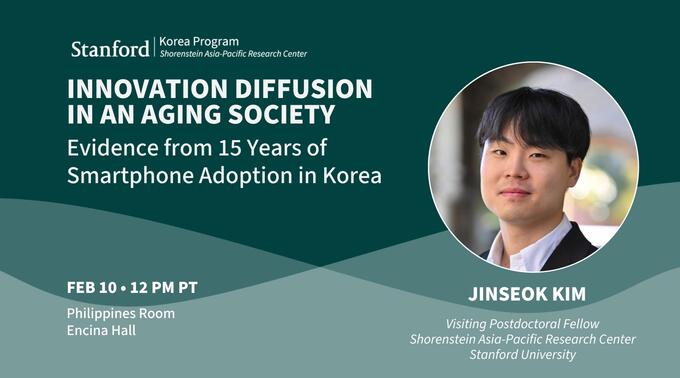
This talk examines how age and generational differences shape smartphone adoption patterns in South Korea, one of the world's most rapidly aging societies. Using discrete-time hazard models, the analysis investigates whether digital divides reflect temporary life stage effects or persistent generational differences that accompany cohorts throughout their lives. Preliminary results reveal striking heterogeneity both across and within age cohorts, suggesting that neither age nor cohort membership alone fully explains adoption patterns. Motivated by these findings, the talk concludes by introducing an age-period-cohort framework designed to separate the distinct effects of aging, different formative experiences (cohort effect), and changing environment (period effect) on technology adoption.
Speaker:
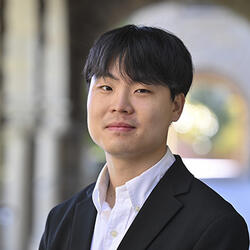
Jinseok Kim is a Visiting Postdoctoral Fellow at Stanford’s Shorenstein Asia-Pacific Research Center (APARC) and the Stanford Next Asia Policy Lab (SNAPL). His research examines economic decision-making and technology adoption through the lens of behavioral and applied microeconomics. Using econometric modeling and experimental approaches, he studies consumer behavior, innovation diffusion, and the interaction between policy, markets, and demographic change. His work contributes to understanding how psychological factors and institutional contexts shape economic choices and the adoption of new technologies.
Philippines Conference Room (C330)
Encina Hall, 3rd Floor
616 Jane Stanford Way, Stanford, CA 94305
Human Rights and Democracy in the Local Community
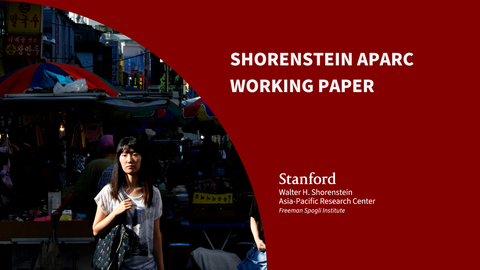
South Korea’s two-decade effort to establish local human rights protection systems through municipal ordinances shows significant progress: all 17 metropolitan governments and 54 percent of basic local governments have enacted human rights ordinances by 2024. Yet implementation remains uneven, with stark urban-rural and regional disparities.
Three factors impede development: absence of national human rights legislation, narrow and conflicting understandings of human rights (particularly regarding sexual minorities), and weak social consensus. Political orientation heavily influences outcomes, with conservative forces often opposing ordinances while progressive governments advance them. Several cases demonstrate how ordinances were abolished or weakened following electoral shifts.
The author, seeing strengthening local democracy as crucial for human rights advancement, calls for measures including electing rights-conscious leaders, ensuring resident participation, establishing dedicated human rights institutions, and building social consensus around protection systems. Local human rights committees and specialized bureaus—mandated by many ordinances but poorly implemented—must function as genuine governance bodies rather than rubber-stamp mechanisms.
Local democracy and human rights protection must develop simultaneously in a mutually reinforcing relationship, with democratic processes enabling rights advancement and robust rights protections strengthening democratic institutions.
The Case of South Korea
Without Securing Talent, Korea Has No Future
This essay was first published by Seoul National University's Institute for Future Strategy. You can also view the Korean version.
Technological hegemony surrounding artificial intelligence (AI) has emerged as a central facet of national economies and security. Global competition among countries and corporations to secure high-level talent has intensified into a matter of survival. Worldwide demand for AI talent now exceeds supply by more than threefold. In Silicon Valley, AI dominates the discussion, and competition among big tech firms to attract talent is escalating. Ultimately, the rivalry between the United States and China will be decided not only by capital or technology but by who succeeds in attracting and retaining global talent.
In South Korea, concerns over talent outflows from Korea are growing. Last year, Korea ranked fourth among the 38 OECD countries in terms of AI talent outflow. Compared to other advanced economies, Korea’s AI industrial ecosystem remains underdeveloped, while overseas firms offer better compensation and research environments. The recent phenomenon of 56 Seoul National University professors relocating abroad over the past four years, a “new brain drain,” must be understood in this broader structural context.
This reality is also clearly reflected in the Global Talent Competitiveness Index, published annually by INSEAD. Korea ranked 31st this year, a position disproportionately low relative to its economic standing, and fell seven places compared to two years ago. In particular, Korea performed poorly in attracting and retaining talent, ranking 55th and 37th, respectively. These findings suggest that, beyond economic incentives, social, cultural, and environmental factors play a decisive role in talent mobility.
Korea’s talent outflow is especially alarming because it coincides with record-low fertility rates and rapid population aging. Before this convergence hardens into irreversible decline, Korea must establish a Ministry of Human Resources to oversee a comprehensive national talent strategy and devise systemic measures for talent development, attraction, and utilization.
Talent Portfolio Theory

In a recent book published by Stanford University Press, The Four Talent Giants, I proposed a framework titled “talent portfolio theory.” Just as financial investment strategies adopt a portfolio approach, national talent strategies should also be portfolio-based, emphasizing diversification to minimize risk and continuous adjustment (rebalancing). In other words, just as financial portfolios are composed of cash, stocks, real estate, and bonds, talent portfolios consist of four elements—the “4B's”: brain train, brain gain, brain circulation, and brain linkage.
Moreover, just as investors design different portfolios, each country’s talent portfolio varies depending on its economic needs as well as cultural and institutional contexts. Japan, Australia, China, and India (all discussed in the book) include all four B's but have constructed distinct portfolios that contributed to their respective economic development. A portfolio approach transcends the traditional binary of “brain drain versus brain gain” and offers a more comprehensive and flexible framework for understanding national talent strategy, one that is particularly relevant for Korea.
First, “brain train” refers to developing domestic human resources through education and training. It is a fundamental element of any portfolio. In Japan’s portfolio in particular, homegrown talent accounts for a large share. Japan has favored domestically educated and trained talent over foreign or overseas-trained individuals, making them the backbone of its economic development.
By contrast, Australia places greater emphasis on “brain gain.” Brain gain involves importing foreign labor, and approximately 30 percent of Australia’s workforce is foreign-born. Until the 1970s, Australia upheld the “White Australia” policy, but a major shift toward multiculturalism subsequently elevated brain gain to a central position in its portfolio. Brain gain pathways include the study-to-work route, where international students remain for employment, and the work-to-migration route, where individuals enter on work visas and later settle. Australia has effectively utilized both pathways.
“Brain circulation” involves bringing back nationals who were educated or employed abroad, and it has been critical to China’s portfolio. Following China’s opening in the 1980s, Chinese nationals came to represent the largest share of participants in the global talent market, including international students. Approximately 80 percent of them returned to China after the 2000s. Known as haigui (sea turtles), these returnees played prominent roles in China’s science, technology, education, and economy, supported by numerous central and local government programs designed to promote talent circulation.
“Brain linkage” refers to those who do not return home after studying or working abroad but instead serve as bridges between their host countries and their homeland. By leveraging their local networks, social capital, they support their home country from abroad, making this a key component of India’s portfolio. India refers to them as a “brain bank” or “brain deposit,” exemplified by leaders of Silicon Valley big tech firms such as Google CEO Sundar Pichai.
However, all talent portfolios carry inherent risks. When adjustment is delayed or fails, risks can escalate into crises with negative effects on the broader economy. The experiences of the four countries illustrate this point.
Japan has faced two major risks. A talent strategy centered on domestic talent weakened its global competitiveness, while demographic decline reduced its labor pool. Although Japan actively attracted foreign students to increase brain gain, its exclusive social and cultural environment limited their integration into the workforce after graduation. While there are many reasons behind Japan’s “lost 30 years” since the 1990s, one factor was its failure to adjust a portfolio overly concentrated on domestic talent in a timely manner.
Australia has confronted rising anti-immigration sentiment and tensions with China. Public concern grew over excessive immigration and perceived threats to national identity, prompting the government to tighten immigration policies. Amid conflict with China, Australia diversified its foreign talent sources from China to India and Southeast Asia. The pandemic, which restricted cross-border mobility, dealt a severe blow to Australia’s talent attraction efforts.
In China’s case, despite aggressive brain circulation policies, top-tier global talent has remained hesitant to return, as relinquishing careers built abroad is not easy. China accordingly shifted its focus toward brain linkage for these elite individuals. At the same time, brain circulation and linkage strategies became a source of friction with the United States, and rising anti-immigration and anti-China sentiment in the U.S. and Europe reduced opportunities for study and employment abroad. Recently, China has adjusted its portfolio to strengthen domestic talent development.
India, despite its strong brain linkage, remains vulnerable to brain drain. However, as economic opportunities expand domestically, return migration has increased, gradually reshaping its portfolio composition.
What Should Korea’s Talent Portfolio Strategy Be?
What, then, about Korea? Let us examine Korea’s situation by comparing it with the four countries through the lens of talent portfolio theory.
Brain train: Human resources have been critical to Korea’s economic development, with the government playing a central role. Key examples include preferential policies for technical and commercial high schools during the 1970s under the Park Chung Hee administration to support industrialization, and efforts to internationalize universities in the 1990s as part of globalization. While less dominant than in Japan, brain train has constituted a significant share of Korea’s talent portfolio.
Brain gain: Korea has imported low- and semi-skilled labor from China and Southeast Asia to fill so-called 3D jobs, but attraction of global high-level talent has remained limited. As in Japan, social exclusivity and cultural barriers continue to impede integration.
Brain circulation: Comparable to China, brain circulation has played a vital role in Korea’s economic development. Overseas education and experience have carried strong premiums, and China explicitly benchmarked Korea and Taiwan when designing its own policies.
Brain linkage: Compared to brain circulation, brain linkage has, until recently, occupied a relatively small share of Korea’s portfolio.
Facing the AI era, low fertility, and the crisis of a new brain drain, what strategy should Korea pursue in the global competition for talent? As noted above, rather than fragmented and ad hoc measures, Korea must comprehensively review and continuously adjust its talent strategy through a portfolio approach.
Brain train: Korea must cultivate talent for future industries, particularly in science and engineering. Training should be aligned with AI-related fields to better match university output with corporate demand. The excessive concentration of top students in medical schools must be corrected. Support mechanisms to retain domestic talent should be strengthened. A recent Bank of Korea survey of 1,916 science and engineering master’s and doctoral degree holders working domestically found that 42.9 percent of science and engineering master’s and doctoral graduates are considering overseas employment within three years—an alarming signal. While brain train will remain vital, its relative share is likely to decline.
Brain gain: As demographic crises intensify and the share of brain train diminishes, the necessity and importance of brain gain will grow. In particular, Korea must actively utilize the more than 300,000 foreign students currently in the country as human and social capital. At present, universities focus merely on filling enrollment quotas, and most foreign students either leave Korea immediately after graduation or remain employed only briefly. This, too, constitutes a form of brain drain. To increase the share of brain gain in the portfolio, foreign students must be managed holistically from selection to graduation and employment. While immigration is ultimately inevitable, it must be approached cautiously and deliberately, considering its impact on the domestic labor market and anti-immigration sentiment. Australia’s successful experience offers useful lessons.
Brain circulation: Although it occupies a relatively modest share of Korea’s portfolio, a certain level should be maintained. With declining numbers of students studying abroad and reduced inclination among overseas Koreans to return, care must be taken to prevent a sharp drop in this component. Otherwise, Korea risks losing global competitiveness, as Japan’s experience warns.
Brain linkage: Alongside brain gain, brain linkage is crucial to Korea’s portfolio adjustment. Key target groups include departing domestic talent (the new brain drain), foreign students, and the diaspora. Although their likelihood of reemployment in Korea is low, their potential for exchange and collaboration with Korea remains open. Like India, Korea should foster and support brain linkage by treating them as a “brain bank” or “brain deposit.”
Toward the Establishment of a Ministry of Human Resources
At the national level, a control tower is needed to design an optimal talent portfolio and make timely adjustments. Korea should establish a Ministry of Human Resources by consolidating functions currently dispersed across the Ministry of Education (universities and graduate schools), the Ministry of Science and ICT (R&D), and the Ministry of Employment and Labor (foreign employment support). It is worth recalling that Singapore, ranked first globally in talent competitiveness, established its Ministry of Manpower early on. Expanded and reorganized from the Ministry of Labor in 1998, it played a pivotal role in transforming Singapore into a talent powerhouse. Through education and development investments, Singapore strengthened domestic talent competitiveness while opening its doors to multinational talent, and it also implemented policies to promote talent circulation and linkage. From the perspective of talent portfolio theory, Singapore represents a successful case of diversification and continuous adjustment. In the increasingly fierce global competition for talent in the AI era, nations and firms that fall behind cannot secure their future. Korea is no exception.
Read More
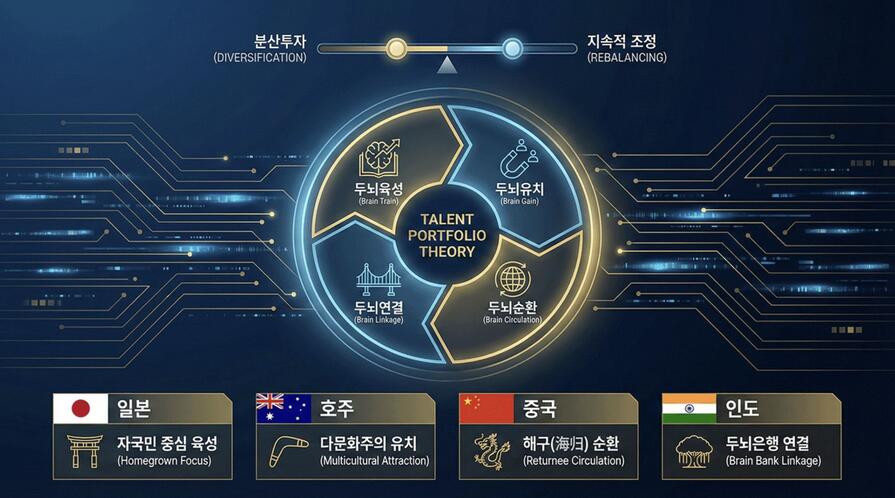
To survive in the global competition for talent while facing the AI era, low fertility, and the crisis of a new brain drain, South Korea must comprehensively review and continuously adjust its talent strategy through a portfolio approach.
Healthcare Workforce Shortages and Patient Health Outcomes: Evidence from South Korea
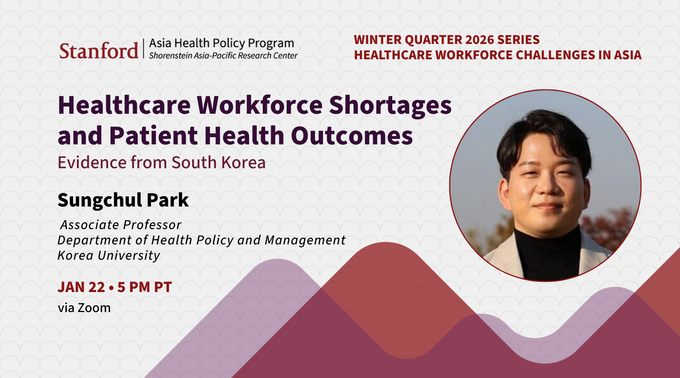
In February 2024, the South Korean government announced an expansion of medical school enrollment by 2,000 students to address physician shortages, prompting widespread opposition from the medical community. On February 19, 2024, over 90% of trainee doctors—representing approximately one-third of physicians at major teaching hospitals—resigned and launched a nationwide walkout that lasted until August 2025. This 18-month walkout constituted a major workforce shock in a universal, single-payer system and created a rare opportunity to evaluate effects on mortality, health care use, and spending. Hear from Prof. Park as he presents the results of a study on the impacts of the walkout.
Using a difference‑in‑differences design, the findings reveal significant increases in 30‑day and 90‑day in‑hospital mortality and in weekly all‑cause mortality. Health care utilization declined across inpatient and outpatient settings, with a greater relative reduction in hospital admissions. Hospitalizations dropped primarily for simple and general conditions, whereas admissions for complex conditions remained stable. Mean spending per hospitalization rose substantially, and spending per outpatient visit increased modestly. There was little evidence of systematic substitution of care from teaching hospitals to non‑teaching facilities or primary care settings. Overall, the nationwide trainee doctor walkout in South Korea was associated with higher mortality and lower health care utilization. These findings underscore the vulnerability of health systems to workforce disruptions and highlight the need for policies that strengthen staffing resilience, contingency planning, and communication mechanisms between the government and the medical workforce.
Speaker:
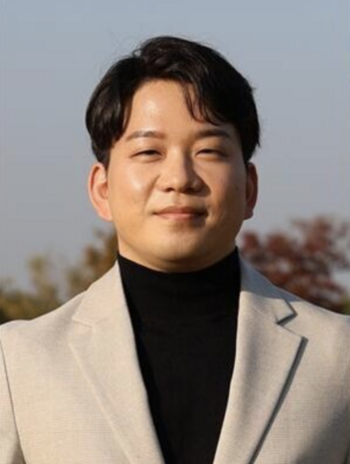
Sungchul Park is an Associate Professor in the Department of Health Policy and Management at Korea University (Republic of Korea). He previously held tenure-track faculty positions at Drexel University (United States) and Ewha Womans University (Republic of Korea). As a health economist and health services researcher, he studies how to design better health care systems that deliver high-quality care at a reasonable cost while ensuring equitable access. His research evaluates the value of health care by assessing both costs and patient and population health outcomes and investigates payment and care delivery reforms, with an emphasis on value-based care. He also analyzes how emerging technologies, including artificial intelligence and digital health, affect cost, quality, access, and efficiency in health care. In addition, he compares health system performance across high-income countries, particularly OECD members, to identify policies that improve care and well-being.
Zoom
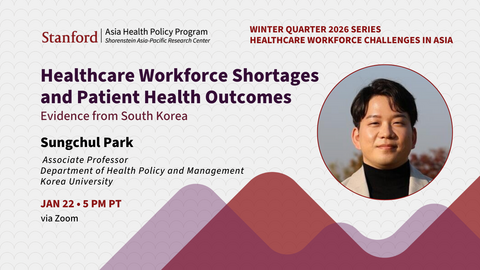
A World Safe for Autocracy: What China Wants and the Domestic Politics that Drive It
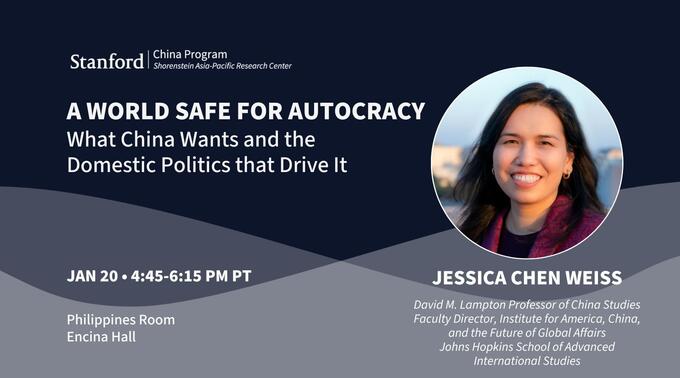
Beneath Xi Jinping’s grand slogans of a “Chinese dream” and a “shared future for humankind,” there are internal tensions, debates, and competing interests that continue to shape China’s approach to the world. Through the lens of domestic politics, nationalism, and regime insecurity in China, Weiss will examine the evolving and contested landscape of what “China” wants. The talk will conclude with policy implications for the United States, prospects for peaceful coexistence, and the future of international order.
Speaker:
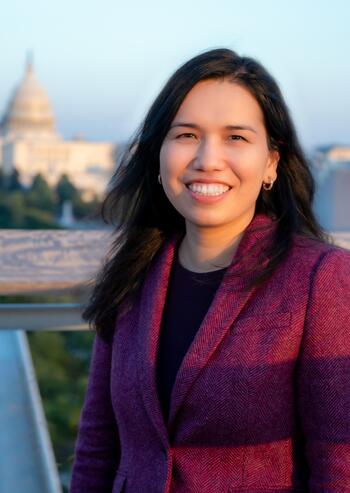
Jessica Chen Weiss is the David M. Lampton Professor of China Studies at Johns Hopkins University's School of Advanced International Studies and the inaugural faculty director of the Institute for America, China, and the Future of Global Affairs (ACF) at SAIS. From August 2021 to July 2022, she served as senior advisor to the Secretary's Policy Planning Staff at the U.S. State Department on a Council on Foreign Relations Fellowship for Tenured International Relations Scholars (IAF-TIRS). Weiss is the author of Powerful Patriots: Nationalist Protest in China’s Foreign Relations (Oxford University Press, 2014). Her research appears in International Organization, China Quarterly, International Studies Quarterly, Journal of Conflict Resolution, Security Studies, Journal of Contemporary China, and Review of International Political Economy. With commentary in the New York Times, Washington Post, Foreign Affairs, Los Angeles Times, and the Ezra Klein show, Weiss was profiled by the New Yorker and named one of Prospect Magazine's Top Thinkers for 2024. Weiss is also a nonresident senior fellow at the Asia Society Policy Institute Center for China Analysis and previously the Michael J. Zak Professor for China and Asia-Pacific Studies at Cornell University and an assistant professor at Yale University. She founded FACES, the Forum for American/Chinese Exchange at Stanford University. Born and raised in Seattle, Washington, she received her Ph.D. from the University of California, San Diego.
Philippines Conference Room (C330)
Encina Hall, 3rd Floor
616 Jane Stanford Way, Stanford, CA 94305
Why Women Leave: Gendered Pathways of Global Talent
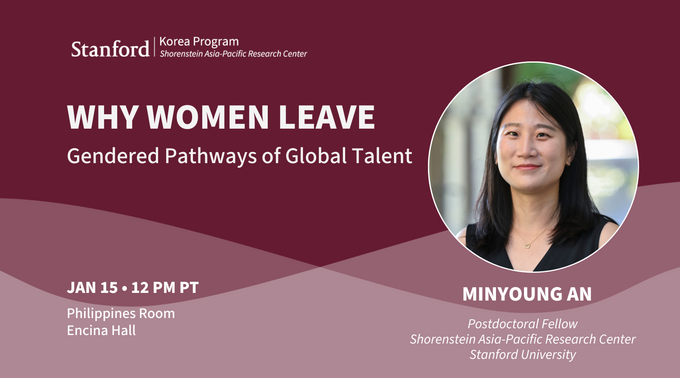
This talk examines how gender and gender inequality shape global talent migration, with a focus on flows to the United States. Conceptualizing gender as both an individual attribute and a structural condition, An shows how macro-level inequalities and micro-level aspirations jointly organize migration pathways. Using South Korea as a case study, the analysis demonstrates that women migrating to the U.S. are more educationally selective than men, suggesting that gender inequality drives women's talents abroad. The talk also introduces comparative work on Korea and Taiwan that investigates gendered return patterns among U.S.-trained PhDs.
Speaker:
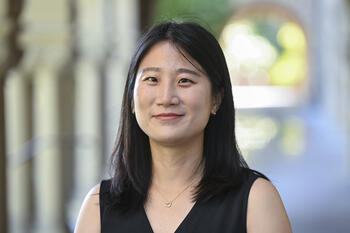
Minyoung An is a Postdoctoral Fellow at Stanford’s Shorenstein Asia-Pacific Research Center and the Stanford Next Asia Policy Lab (SNAPL). Her research investigates how gender shapes global talent flows and the career trajectories of highly skilled workers. Using large-scale datasets and mixed methods, she examines educational selectivity, gendered return migration, and transnational academic linkages. Her work advances understanding of how gender inequality structures pathways of skilled migration and global talent circulation.
Philippines Conference Room (C330)
Encina Hall, 3rd Floor
616 Jane Stanford Way, Stanford, CA 94305
Minyoung An
Minyoung An joins the Walter H. Shorenstein Asia-Pacific Research Center (APARC) as Korea Program Postdoctoral Fellow beginning July 2025 through 2027. She recently obtained her doctorate in Sociology from the University of Arizona. Her research lies at the intersection of gender, transnational migration, and knowledge production, combining statistical modeling, computational methods, and in-depth interviews.
Her dissertation analyzes gendered migration patterns in South Korea and among international PhD students in the U.S., revealing how gender inequality in countries of origin produces distinct selection effects and return migration dynamics. She also studies academic career trajectories and prestige hierarchies, exploring how gender and national origin affect integration into global academia.
At APARC, she will be involved with the Korea Program and the Stanford Next Asia Policy Lab (SNAPL) as she pursues two projects that extend this research agenda: one using computational analysis of social media data to examine gendered migration intent, and another investigating the academic trajectories and institutional reception of international scholars from East Asia. Through these projects, she aims to advance understanding of how transnational inequalities shape global mobility, opportunity, and inclusion.
South Korea’s Fractured Democracy: One Year After Martial Law
This commentary first appeared in The Diplomat magazine.
In March 2025, one of the authors vividly observed hundreds of thousands of people filling downtown Seoul over President Yoon Suk-yeol’s impeachment. Reminiscent of the “candlelight protests” of 2017 but with greater intensity, these rallies began after the short-lived martial law declaration of last December, with some demanding Yoon’s immediate removal from office and others denouncing it as illegitimate. Even after the Constitutional Court’s unanimous decision to impeach him on April 4, rival protests continued through the June 3 snap elections.
Such rallies were hardly unprecedented in South Korea, given its rich history of civic engagement in politics. However, in the context of Yoon’s martial law declaration and subsequent impeachment, the protests illustrated a fragile democracy divided against itself. In fact, Yoon had justified his action as a necessary measure to remove “anti-state forces” in the face of the intensifying political fight with opposition forces, which controlled South Korea’s legislature throughout Yoon’s presidency.
Public opinion polls and election outcomes show how deeply divided the nation has been. A 2022 Pew survey found that 83 percent of South Koreans believed there were strong partisan conflicts, the highest among all 19 countries surveyed. Recent election results reflected such societal and political division. Yoon’s razor-thin 2022 victory over Lee Jae-myung and Lee’s narrow win in the 2025 snap election revealed a nation split down the middle.
In addition, mass protests, largely associated with progressives, have become common for conservatives too and spilled from plazas to online platforms. Politics has turned into “culture wars” and competing claims to be representative of “the people,” provoking moral charges and emotional responses. Polarization now cuts across gender and generational lines beyond political and ideological divisions of the past, standing alongside illiberalism and populism as a core threat to Korean democracy.
Continue reading via The Diplomat >
Sign up for APARC newsletters to receive our experts' insights >
Read More
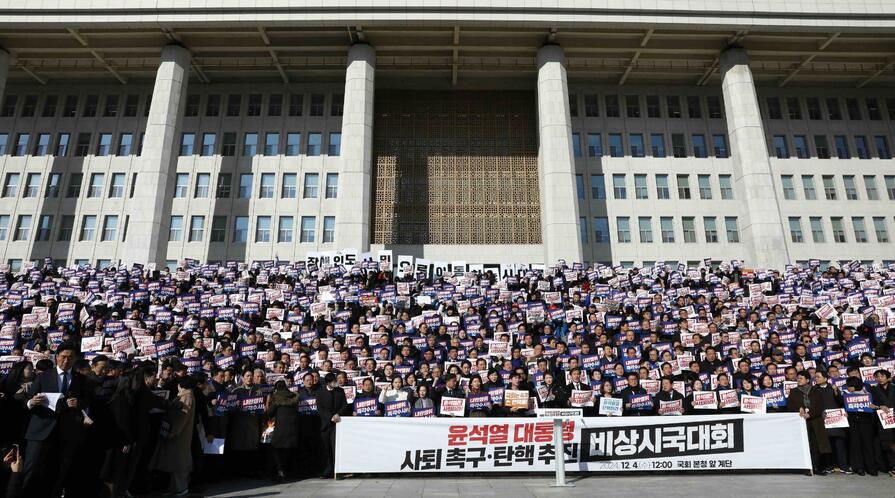
The country’s political polarization has metastasized. What can be done?

